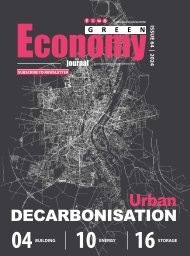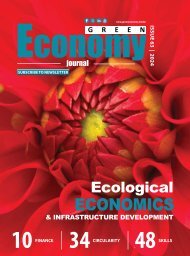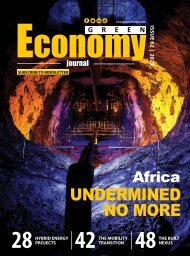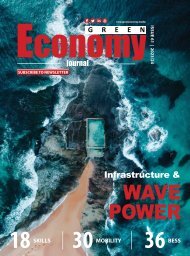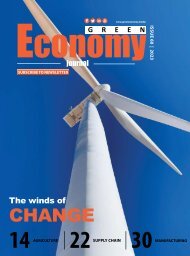Green Economy Journal Issue 39
Create successful ePaper yourself
Turn your PDF publications into a flip-book with our unique Google optimized e-Paper software.
ECONOMY
Green Building Council of South Africa. Collectively, these buildings are
yielding significant water and electricity efficiencies, easing the strain on
our natural resources.
In response to heightened demand from clients for sustainable and
impactful investment expertise, Standard Bank Group recently formed a
sustainable finance business unit. This unit has raised a US$200m green
bond, which it will use to finance eligible green projects – renewable
energy, energy efficiency, water efficiency and green buildings.
Renewable energy comes to the fore
We are currently seeing a surge in demand for decentralised renewable
energy projects, where clients can reduce their reliance on the national
grid through self-generation.
This trend has been boosted by Government’s positive comments
towards support to unlock the regulatory environment to allow companies
to produce their own power – one of several steps underway to open up
the market. There is a strong demand for renewable energy within the
mining industry, which is on a drive to raise environmental, social and
governance (ESG) scores as investors promote the sustainability agenda.
Thanks to sharp cost declines, solar power solutions are more attractive
than before, and costs are still coming down. There are now numerous
providers of modular solar technologies, and the industry is benefiting
from global learnings and best practices that have been developed over
the years. And while the accompanying energy storage units remain
relatively expensive, these costs are declining with technology becoming
more bankable.
Further, demand for decentralised power is being partly driven by
continued instances of load-shedding and steep tariff hikes for companies
tied to the national grid, which is expected to continue for at least another
18 months (in the case of South Africa).
Industrial firms too are expressing a renewed interest in off-grid solutions,
particularly rooftop solar installations, focusing on the reliable and
sustainable supply of power. In most cases, hybrid solutions are considered,
contracted over a 10- to 15-year period to support price certainty.
While South Africa remains Africa’s biggest market for renewable
energy, neighbouring countries including Namibia, Mozambique and
Botswana are following a similar path, as are others across the continent.
There is pent-up demand for sustainable finance that unlocks these
projects, and we believe the market is set to grow rapidly now that more
funding solutions are being brought to market.
Government playing its part
The Government is also taking steps to stimulate the green economy.
In his budget speech, Finance Minister Tito Mboweni said the carbon
tax will bring in R1.75bn over the next few months, and that this will be
complemented by more focussed spending on climate change mitigation.
The carbon tax is aimed at encouraging a shift towards cleaner sources
of energy and is underpinned by the fact that the urgent need to address
climate change need not be at the expense of economic growth.
The first phase of the carbon tax’s implementation, which runs to 2022,
is about sensitising the market to the pricing of carbon emissions and
involves relatively modest tax rates. However, with rates set to increase in
phase two, companies need to be as prepared as possible.
A business-as-usual scenario is no longer an option and we must take
appropriate action to help transition our economy onto a low-carbon
growth path, as articulated in South Africa’s National Development Plan.
The carbon tax is one of the policy instruments in play to nudge the
economy onto a sustainable trajectory.
We see the next two to three years as being a critical window for
the green economy – a period in which many far-reaching policy and
investment decisions will be made.
Green Economy Journal - GreenEconomyOnline
greeneconomy.media
Climate change is one of the
greatest issues of our time,
and banks have an essential
role to play in reducing the
carbon-intensity of the
world economy.
Encouragingly, the world-renowned renewable energy independent
power producer programme (REIPPP) is gaining fresh momentum.
Minister Mboweni said bid window four of the programme is being
accelerated, while the rapid decline in renewable energy prices bodes well
for the next round of bidding.
A large number of international and local groups are gearing themselves
up for future bidding rounds, and the local banking sector is positioning
itself accordingly.
Government has also launched a Request for Information (RFI) for
the procurement of emergency power through a Medium-Term Power
Procurement Program (MTPPP) for 2-3GW. The Department of Mineral
Resources and Energy (DMRE) will communicate next steps in due course. At
the same time, it will soon be possible for financially healthy municipalities
to buy electricity directly from independent power producers.
The budget document shows that of the 91 active renewable energy
projects, 64 are already operational – adding about 4 gigawatts of power
to the national grid. The 27 projects that are currently under construction
are expected to add another 2.4 gigawatts to the grid.
As the next round of bidding gets underway, and as private companies
move towards decentralised solutions while municipalities procure their
own power, renewable energy is set to account for an increasingly larger
portion of South Africa’s energy mix.
Alongside the trend towards green buildings and the adoption of
water- and energy-efficiency initiatives, this augurs well for South Africa’s
green economy.
Broad approach needed
All organisations should be considering green initiatives and finance
solutions as investors increasingly shift their mandates towards
sustainability. A focus for Standard Bank will be looking at opportunities
aligned to its sustainable bond framework. These include renewable
power projects – including wind, solar, hydropower, biomass, biogas and
geothermal projects – and initiatives to replace refrigerants with loweremission
alternatives.
Climate change adaptation projects – for instance, the expansion or
maintenance of flood defence systems – could also qualify, as can initiatives
to increase the resilience of agribusinesses against climate change.
Energy efficiency projects, green buildings, green transportation and
pollution-control initiatives could also qualify.
These initiatives will help to ensure sustainable economic growth and
the safeguarding of our natural environment. Climate change is one of
the greatest issues of our time, and banks have an essential role to play in
reducing the carbon-intensity of the world economy.
As Africa’s largest bank by assets, Standard Bank fully recognises the
importance of its role. The bank considers itself as bound by Article 4 of
the Paris Agreement, and has published restrictive policies on the funding
of coal-fired power projects and coal mining projects. The group also
recently became a founding signatory to the United Nations’ Principles for
Responsible Banking.
This bolsters our commitment to Africa’s green economy.
13




